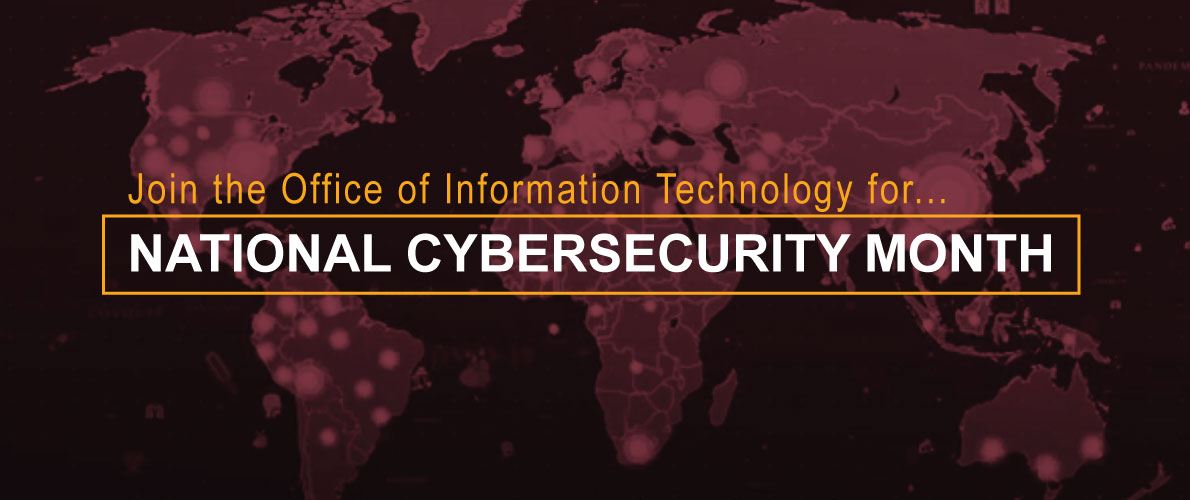Join the Office of Information Technology in supporting National Cybersecurity Awareness Month. Throughout the month of October, OIT will be sharing information and resources to raise awareness about cyber security threats and increase our resiliency against them.
Our phones, computers, tablets, and all other smart devices make our lives easier; they also make us more vulnerable to security threats. Since we are more connected than ever before, it is increasingly important to exercise caution when using technology devices and accessing the internet.
During the summer, the OIT provided extensive online security awareness training to faculty and staff. This training covered many security-related issues such as what common threats look like, how to avoid them, and how to get assistance if you suspect something isn’t right. In taking this training, participants have decreased their personal vulnerability to cyber-attacks and increased security for the University and campus community. If you missed out on the training, but would still like to take it, we encourage you to send an email to oittraining@siu.edu to get started!
In addition to this training, there are resources available to help you stay educated, diligent, and cautious. To stay up-to-date on this information, view the OIT security website: https://oit.siu.edu/infosecurity/security-month.php. And...stay tuned for additional security articles throughout the month.
If you have a security-related question or need immediate technology assistance, contact SalukiTech at 618/453-5155 or salukitech@siu.edu.
All it takes is one mistake for hackers to retrieve your personal information, credit cards, or password history. With over 4 billion people using the internet every day, it is more important than ever to make sure you are keeping your devices safe. Although it may seem impossible, there are still several steps that you can take to browse the internet more securely.
Use Strong Passwords: We all get annoyed with long passwords or too many different characters, but the fact is, passwords are your first line of defense. The stronger your password, the stronger your defense. We recommend using passwords that…
- are 16 characters or longer
- have at least one special character: ?.[]{}-!+*_~
- include upper and lower case letters
- in the form of a passphrase
On the topic of passwords, you should never reuse them. If all of your accounts have the same password, hackers only need to hack one account to access them all.
Use VPN when accessing public Wi-Fi: Free or public Wi-Fi can be useful; however, it is also less secure. If you must use a public connection, do so with a VPN (Virtual Private Network). VPNs provide an extra level of security and anonymity by hiding your browsing history, IP address and location.
SIU provides VPN access for those individuals that are working or attending classes remotely. VPN access is also available for those individuals who need it to complete their work, regardless of whether they are working remotely or not. You can learn more about VPN and how to request it by visiting the Network Engineering website.
Think Before You Click: Even with other precautions in place, clicking a bad link or opening a bogus attachment can let hackers and viruses in. Hover above URL’s to see where they are taking you before you click on them. Does the link match your expectation? If a link seems questionable, avoid it! For example, if you get a strange email from your bank telling you to login immediately, type their website address in your browser instead of following the link that was provided.
If you receive an email that seems suspicious, you can report it by clicking the "Report Suspicious" button in the top right corner of Outlook on your desktop. In your browser, right-click on the email and select "Report Suspicious." This will send the email to SIU's email checker which will let you know if it is indeed suspicious, or safe for you to interact with.
Don’t Post Personal Information: The more information you post about yourself (important dates, children’s names, pet names, etc.) the more vulnerable you make yourself. Hackers are constantly looking for information to crack your passwords and security questions; don’t give it to them.




